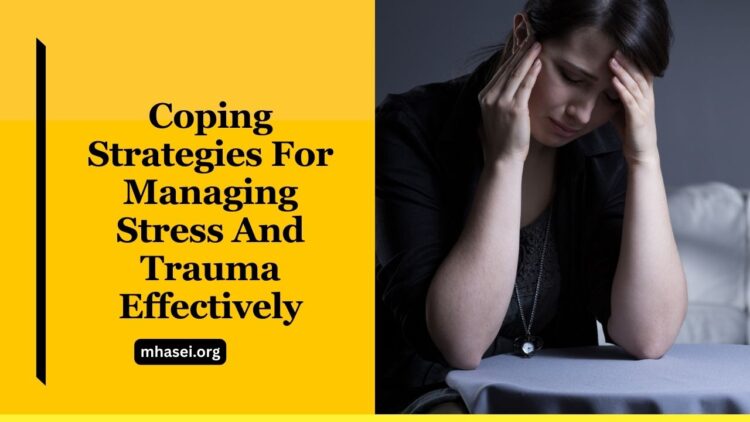Everyone experiences stress and sometimes even trauma in life. Stress can come from work, studies, relationships, or money problems. Trauma may be the result of painful experiences like accidents, loss, or emotional struggles. If not managed well, these issues can harm both mental health and physical health.
The good news is that there are many simple ways to deal with stress and recover from trauma. This guide will explain coping with stress, useful mental health strategies, and practical steps for trauma recovery in easy-to-understand language.
Understanding Stress and Trauma
Stress is the body’s natural reaction to challenges or demands. A little stress can sometimes be helpful, like when preparing for exams. But too much stress over a long time can cause anxiety, tiredness, and health problems.
Trauma, on the other hand, is different. It usually comes from a shocking or painful event. This may include natural disasters, serious accidents, abuse, or sudden loss of a loved one. Trauma can affect emotions, thoughts, and even behavior.
Why Coping Strategies Are Important
Without proper coping strategies, stress and trauma may turn into bigger health problems such as depression, sleep issues, or even heart problems. Learning to handle these challenges early can:
- Improve mental health
- Increase focus and productivity
- Build emotional strength
- Improve physical well-being
- Support trauma recovery
Practical Coping Strategies for Stress
Here are some proven and easy ways to cope with stress in daily life:
- Deep Breathing Exercises – Slow, deep breathing helps calm the mind and body.
- Physical Activity – Walking, running, or yoga releases stress hormones and boosts mood.
- Healthy Sleep Routine – Aim for 7–8 hours of quality sleep to recharge.
- Time Management – Plan tasks and avoid overloading yourself.
- Balanced Diet – Eating healthy foods helps the brain and body handle stress better.
- Talking to Someone – Sharing feelings with friends, family, or a counselor reduces the weight of stress.
Coping Strategies for Trauma Recovery
Trauma recovery often takes more time, but small steps can make a big difference:
- Seek Professional Help – Therapists can guide people through painful emotions.
- Practice Grounding Techniques – Focus on the present moment to avoid flashbacks.
- Create a Support System – Stay connected with trusted people who bring comfort.
- Journaling – Writing thoughts and feelings helps release emotional pain.
- Avoid Harmful Habits – Stay away from alcohol, drugs, or negative coping methods.
Building Long-Term Mental Health Strategies
Mental health strategies should be part of daily life. By practicing positive habits, stress and trauma can be managed more effectively. Some important practices include:
- Mindfulness & Meditation – Helps relax the mind and reduce overthinking.
- Hobbies & Creative Work – Painting, music, or gardening can heal emotions.
- Setting Boundaries – Learn to say no and protect your energy.
- Self-Care – Simple actions like taking a warm bath, reading, or resting can improve mood.
- Regular Check-Ups – Keep track of both mental and physical health.
Quick Guide to Coping Strategies
| Strategy Type | Examples | Benefits |
|---|---|---|
| Stress Management | Deep breathing, exercise, healthy diet | Lowers anxiety, improves focus |
| Trauma Recovery | Therapy, journaling, grounding | Reduces flashbacks, supports healing |
| Mental Health Strategies | Mindfulness, hobbies, self-care | Builds resilience, long-term well-being |
Managing stress and recovering from trauma may feel difficult, but it is possible with the right methods. Using daily coping strategies, staying connected with supportive people, and building healthy habits can transform stress into strength.
Remember, mental health strategies like mindfulness, self-care, and positive lifestyle changes help maintain long-term balance. Recovery is a journey, not a one-time event, and with patience, anyone can move forward toward a healthier and happier life.
FAQs
What are the best ways of coping with stress daily?
The best ways include deep breathing, regular exercise, healthy sleep, balanced diet, and talking to supportive people.
How long does trauma recovery usually take?
There is no fixed time. Some people recover in months, while others may take years. Professional help can speed up the process.
Can mental health strategies really prevent stress from becoming serious?
Yes, practicing mental health strategies like mindfulness, self-care, and healthy habits can prevent stress from turning into bigger health issues.




